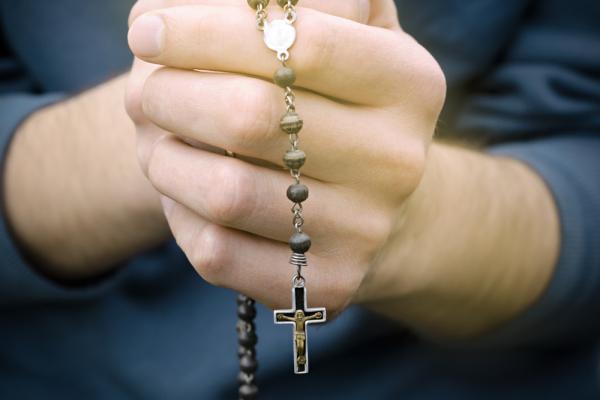As part of this year-long effort to better understand what we mean when we talk about following Jesus, I’ve been making a more concerted effort to pray every day. Even though my tendency is to focus on silent, contemplative reflection, I’ve actually taken on a number of prayers that I do several times each, over a half-hour period or so.
Along with the Lord’s Prayer ("Our Father/God, who art in Heaven…"), the Jesus Prayer ("Jesus Christ, son of God, have mercy on me, a sinner"), the Serenity Prayer ("Lord, grant me the serenity to accept the things I cannot change…") and the Prayer of St. Francis ("Lord, make me an instrument of your peace…"), I also recite the Hail Mary. Not only that, but I use a rosary to go through my prayers.
I’ve shared this with some folks, and inevitably someone is surprised by this. I’ll get something like, “I didn’t know you’re Catholic.” Or, “Why pray to Mary? After all, she’s not actually God.”
Or is she?
Not that I think Mary personally was “God with skin on,” like we sometimes talk about Jesus. But like her son, I do tend to think that she pointed us toward God, which seems to be the one of the most important things Jesus did. In fact, when I’m asked what’s different about Jesus — as compared with other prophets and miracle workers in the Bible — I tend to respond that he, unlike others who preceded him in the biblical narrative, was more like the needle of a compass, pointing us in a common direction, rather than making himself the X marking the spot, the ultimate destination.
For me, Mary does this as well. There’s no story about her in the Gospels that suggests anything other than total devotion to God and to Jesus. In fact, in her conversation with God about becoming Jesus’ mother sounded much like Jesus prayer to God in the garden of Gethsemane, just before he was handed over to be crucified.
Both offered humble submission: Not my will, God, but yours be done.
Also, like many of us, I struggle with the pervasively male God imagery that dominates the Protestant religious landscape. Until very recently, all Protestant churches focused principally — if not exclusively — on God the Father. But for me, at least, this feels woefully incomplete. If God is alpha and omega (beginning and ending), and if in God there is no distinction between male or female, why are we so hell-bent on defining God as such in our religious practices?
Not only that, but if you’re like me, you have a fairly complicated relationship with “father” being synonymous with “love.” Some may argue that our less-than-perfect father figures beg re-imagining, and that God the Father offers that opportunity. But for me, understanding God as all-encompassing and unconditional love calls out for a maternal understanding of the Divine. And Mary offers this: a path to the Divine Feminine that I have sought for so many years.
As for the rosary, I’m sure I don’t use it correctly according to Catholic doctrine. But it grounds me, helps me focus, gives me a sort of prayer “routine,” and connects me more physically to my prayer practice. In experiencing this grounding embodiment, it occurs to me that in breaking free from the hierarchy of Catholicism in the Protestant Reformation, we threw out many proverbial babies with the Catholic bathwater.
This is yet another example of how I have found a new spiritual future by reaching back many centuries into the past. And as someone who wrestles with the very idea of some metaphysical existential “other” somewhere out there, operating above and beyond humanity in some way, these ancient icons, practices, and methods of engaging in spiritual discipline connect me to a more full, more embodied, and even a more transcendent experience of God than I’ve ever had in my faith journey in the past.
So thanks, Mary — for helping lead the way to humble acceptance and a more perfect experience of selfless, unconditional love. I owe you one.
Christian Piatt is the author of postChristian, Blood Doctrine, and the Banned Questions book series, among others. He is engaged in a year-long effort called My Jesus Project to more deeply and honestly follow the life, teaching, and example of Jesus through prayer, study and action. Follow along his journey, and even join in, at www.MyJesusProject.com.
Got something to say about what you're reading? We value your feedback!
